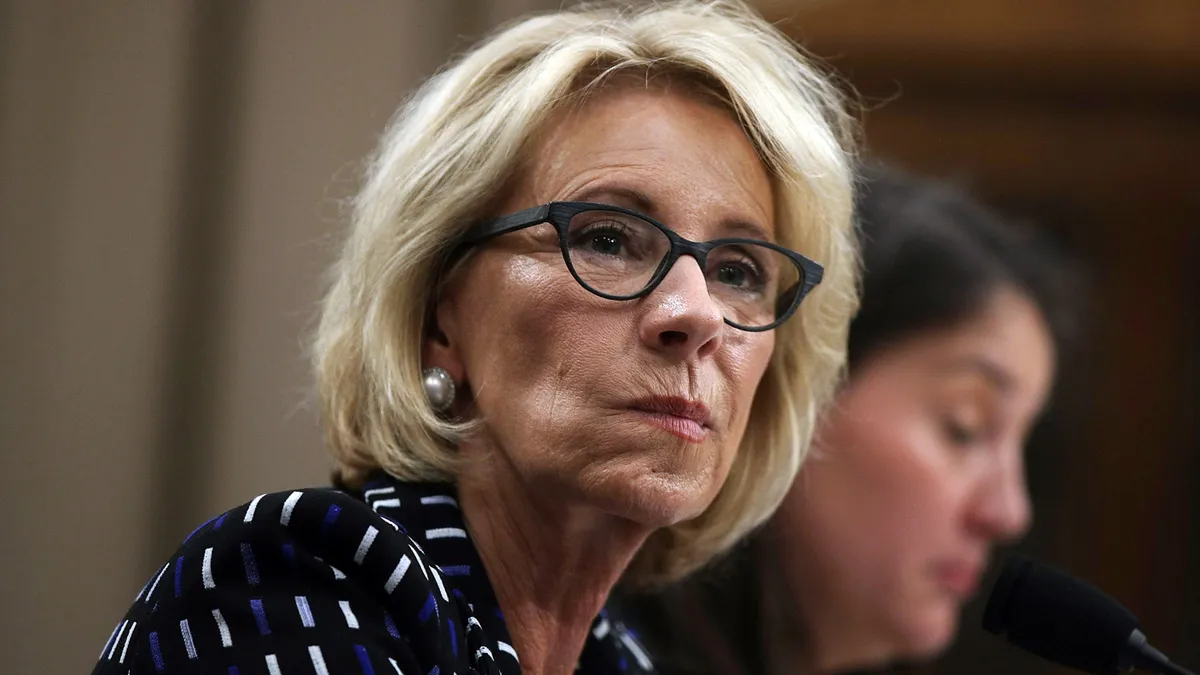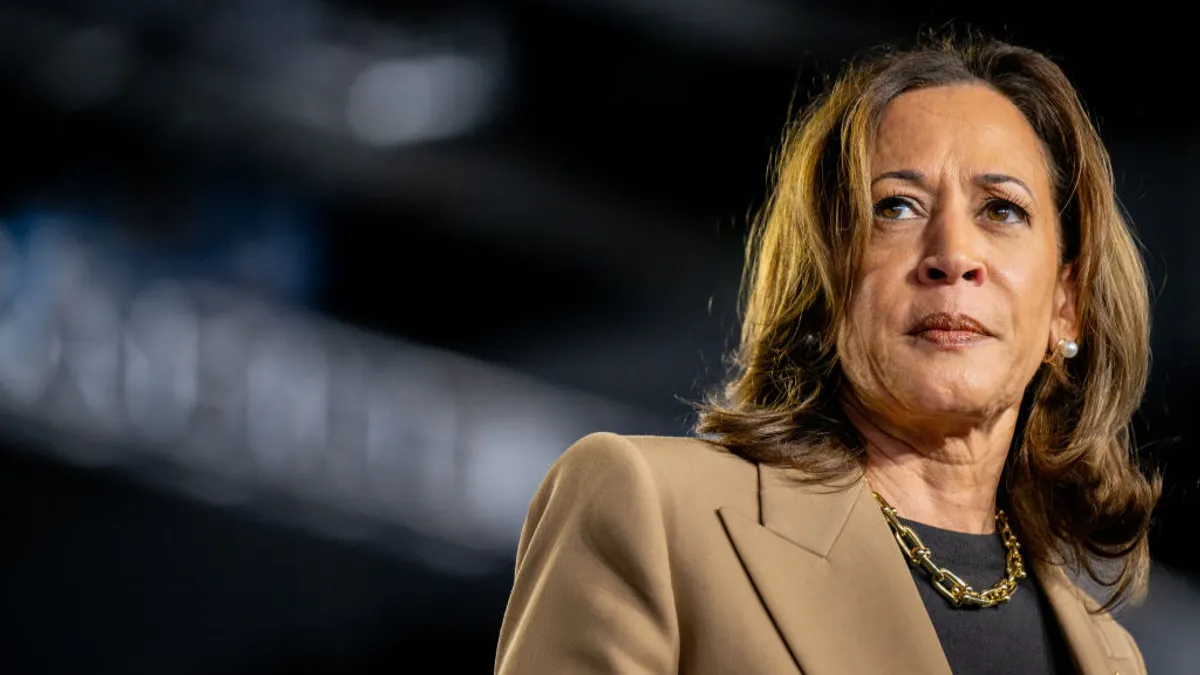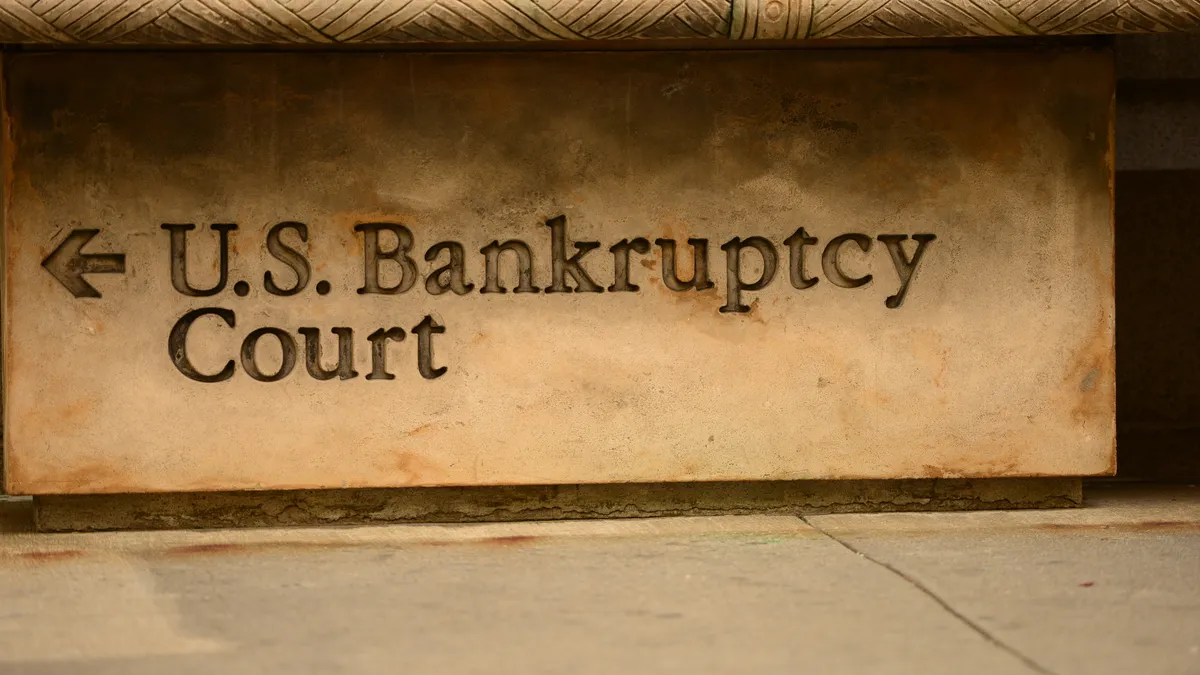Easy as undoing regulations might seem to government outsiders, they typically must go through the same process as writing new ones. And that process almost always takes time, planning and staffing on the part of federal agencies.
Those limits may help explain why for-profit colleges are still operating under borrower defense rules they mostly loathe at a time of broad philosophical alignment with the U.S. Department of Education.
Under Secretary Betsy DeVos, the agency has moved to delay and eventually undo the Obama-era rules finalized in 2016 that laid out the roadmap for students trying to discharge some federal loans taken on at schools that misled or defrauded them, as well as set new restrictions on the sector. The rules gave teeth to existing legislation offering recourse for students in light of the collapse of the for-profit sector.
DeVos' Ed Department proposed new regulations last year using the original 1990s rules as its framework. The department's draft dropped loan discharge consideration for groups of students, increased the standards for proving school misconduct and made other changes largely welcomed by the sector. But legal and procedural hiccups — including missed deadlines and a court ruling that upheld the 2016 version — have stalled the deregulatory efforts.
Last month, officials indicated during a negotiated rulemaking session on an accreditation overhaul that the department planned to issue a new notice of proposed rulemaking (NPRM) for borrower defense, according to several observers at the session who spoke with Education Dive.
Many see staffing shortages at the department as extending the time it might otherwise take to produce new regulations. In the meantime, colleges are still waiting for guidance on how the Ed Department will enforce the Obama-era borrower defense rules and how schools should comply with them. The issue is particularly apt for the for-profit sector, which that version effectively targeted.
"That's the $34,000 question," said Steve Gunderson, president and CEO of Career Education Colleges and Universities, a trade group for the for-profit sector. "Nobody honestly knows what to do. We believe as long as there is a lack of clarity there will be a recognition of that lack of clarity by the department in enforcement."
He added, "We would love to have guidance from the department as soon as possible."
'We don't know what to tell you on that'
The regulatory reset raises questions for college operators and students. The department has, under court order, already begun paying back students affected by some of the largest for-profit collapses in the past decade.
But between now and whatever regulations ultimately come down the pike, the way forward is anything but clear. Clare McCann, deputy director for federal higher education policy at New America, said that the regulatory uncertainty "is very challenging" for schools.
Among the chief compliance issues for for-profit colleges, in particular, is the 2016 version's prohibition against pre-dispute arbitration agreements requiring students to arbitrate privately with schools over complaints.
"We have said to all our members whether you do or do not have a notice on binding arbitration, we would not enforce that at this time until we get some clarity from the department," said Gunderson, noting that his group agrees with the department's draft rules that restored colleges' ability to require students to arbitrate complaints.
"Some schools have asked, 'Do we have to take it out of the enrollment agreement? Do we have to take it off the website, etcetera?'" Gunderson said of the arbitration agreements. "We don't know what to tell you on that."
Although he thinks it is unlikely the Ed Department will "go after" schools with existing enrollment agreements that include binding arbitration, he is cautioning his members not to enforce it for the time being.
McCann said it would not be hard for the department to offer guidance on arbitration agreements or for schools to comply with the 2016 rule nixing pre-dispute arbitration.
Student uncertainty
The lack of clear information on the state of the borrower defense rule and its enforcement could cause students financial pain.
Antoinette Flores, associate director of postsecondary education policy at the Center for American Progress, said it is unclear whether the Ed Department is processing current borrower defense claims. "Under this administration, it's not a guarantee there will be a discharge," she said.
Students who may be eligible under current law for a discharge over misleading school claims might not know their rights. That could include former students of Education Corporation of America (ECA), which closed nearly all of its campuses in December.
In May, the Accrediting Council for Continuing Education & Training (ACCET) denied ECA's Virginia College chain accreditation over job placement issues, management, career services staffing, development training for faculty and other institutional quality issues.
Flores said ACCET's rejection raised multiple red flags for ECA that could justify students applying for borrower defense discharges. So far, the department has only alerted ECA students to the availability of closed school discharges for students directly affected by the disclosure, not borrower defense discharges for school misconduct. (The department's general school closure page for students does include information about borrower defense discharges.)
"They (ECA students) should absolutely be given information about that," Flores said.
McCann said given the size of ECA's student population, which was around 20,000 at its closure, as much as 10% to 15% could be eligible for borrower defense discharges under the 2016 rules. "Will students know they are eligible for a borrower defense discharge?" she asked, noting the department typically doesn't launch fact-finding probes into schools until applications have been filed.
"Nobody honestly knows what to do. We believe as long as there is a lack of clarity there will be a recognition of that lack of clarity by the department in enforcement."
Steve Gunderson
President and CEO, Career Education Colleges and Universities
Former ECA students may need to choose whether to apply for forbearance and wait for a discharge or find an alternative program, a decision made all the more difficult by the lack of clarity around the rules. "I would tell you to fill out your application but to reject forbearance," McCann said. "Because the department is not adjudicating those quickly."
An Ed Department spokesperson said in an email that the agency has received applications from ECA students for borrower defense discharges and that those applications are "pending review."
Barmak Nassirian, director of federal relations and policy analysis for the American Association of State Colleges and Universities, said a key feature of the rule when enforced properly is the opportunity for quick relief from student loans.
"The concept of borrower defense is, if a school substantially misrepresented a product or defrauded you, the government can't just cop the attitude of 'You owe me money, I don't care what you did with it,'" he said. "The fact is, the government is the gatekeeper and has a responsibility to keep bad actors out."
'Catastrophic failures'
In the fog around enforcement, critics also say the department is not using remedies available to it under the 2016 rules to address schools that have deep financial and educational risks.
The Obama-era version includes triggers, both automatic and discretionary, allowing the department to demand letters of credit — a financial instrument typically issued by a bank guaranteeing payment — from financially shaky institutions. Those are meant to help defray costs to taxpayers should the school fail.
In the case of ECA, the Ed Department at one point actually held a letter of credit from the chain, according to court papers from Freedom of Information Act (FOIA) litigation against the department filed by the National Student Legal Defense Network. But the letter expired at the end of March 2017, and ECA had not filed a new one as of Nov. 14, 2018, the date the Ed Department responded to the FOIA request.
An Ed Department spokesperson said the agency had been "closely monitoring ECA's financial health and administrative capability for years."
The chain posted a $27.1 million letter of credit in 2015 after it failed financial responsibility standards to receive Title IV funding that September. At the end of 2015, an audit found ECA's composite score of 1.7 to be above the minimum standard, and the letter was released when it expired in March 2017, according to the department.
On Nov. 14, 2018, about three weeks before the school shut down, the department notified ECA that its composite score, at 0.7, was again below financial responsibility standards and would be required to post a letter of credit. Earlier that month, the school was placed under Heightened Cash Monitoring 2.
Nassirian said a letter of credit could "absolutely" have prevented the sudden collapse of schools like ECA, but enforcing existing law could have protected students long before circumstances came to that.
"A different administration that wanted to protect taxpayers and students would have absolutely taken steps way earlier to ensure we don't have the kinds of catastrophic failures we are seeing," he said, adding that borrower defense charges are a "lagging indicator" of the problems they represent.
"By the time there is consciousness of having been ripped off, and people step up ... in reality, the operation is probably already on the ground, it has already failed," he said. "This is basic program management."
'No idea' what comes next
The uncertainty extends to expectations around the department's second go at a rewrite.
Gunderson said his group "has no idea" what significant changes could come about. But he hopes they come soon. "We believe the basic direction they were going on in both borrower defense and gainful employment was the correct direction," he said. "And we would like to have as long a period of time as possible so that, if there was a change in administrations in 2020, there would be enough of a track record to justify not reopening the issue."
The current Ed Department's draft rules include a provision that would disqualify students for closed school discharges if a teach-out agreement had been forged by the closing school and offered to students. The inclusion was controversial, given that the teach-out program may not align with a student's particular educational needs. Department officials said at accreditation rulemaking meetings that it won't be in the future borrower defense rules, said McCann, who attended the hearings.
The department has also indicated it was considering measures to ensure schools' financial responsibility but offered no specifics about provisions, McCann said. The draft rules weakened triggers created in 2016 for requiring letters of credit, in McCann's view. Those 2016-rule triggers included failure to comply with the 90-10 rule around public revenue sources, default rates at 30% or higher and accreditor requirements for teach-out plans. Some triggers were also at the department's discretion, such as dropout rates, show-cause orders from accreditors and fluctuating federal aid levels.
"By the time there is consciousness of having been ripped off, and people step up ... in reality, the operation is probably already on the ground, it has already failed. This is basic program management."

Barmak Nassirian
Director of federal relations and policy analysis, American Association of State Colleges and Universities
The for-profit sector was not a fan of the letter of credit provisions. "We don't anticipate this administration will use that as a tool to put a school out of business the way the Obama department did," Gunderson said. "So it's not a major concern, unless it becomes permanent policy." He added that the industry is outlining legislation to take to Capitol Hill that would allow ailing for-profits continued access to Title IV funds so students could finish their programs if a school was facing closure.
In addition to uncertainty around the specifics of the final borrower defense rules, there are also questions about their legal durability given that the department has told stakeholders it plans to skip a negotiated rulemaking process for its rewrite of the rewrite.
Critics quickly condemned the department over the plans to redo the rules without returning to a negotiation process with higher ed stakeholders. New America's McCann said it is an "open question" whether the department can legally bypass negotiated rulemaking this time around. But not all critics are unhappy with the decision. Some hope it will present an opening for a viable legal challenge.
"I actually welcome this because I know that it is procedurally unsound," Nassirian said. "The decision to short-circuit the process again will only serve to delay the damage that they intend to victims (of for-profit colleges)."























